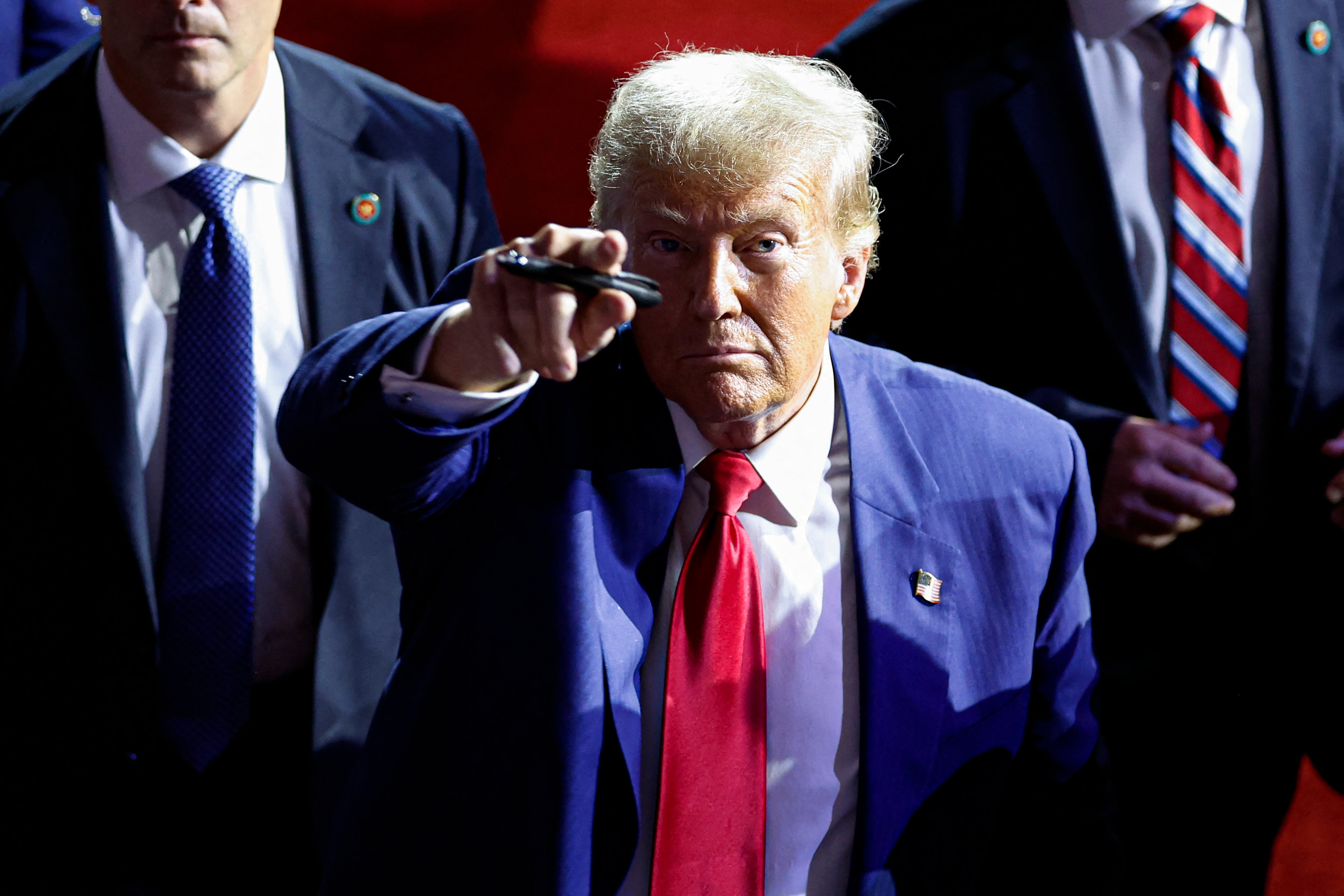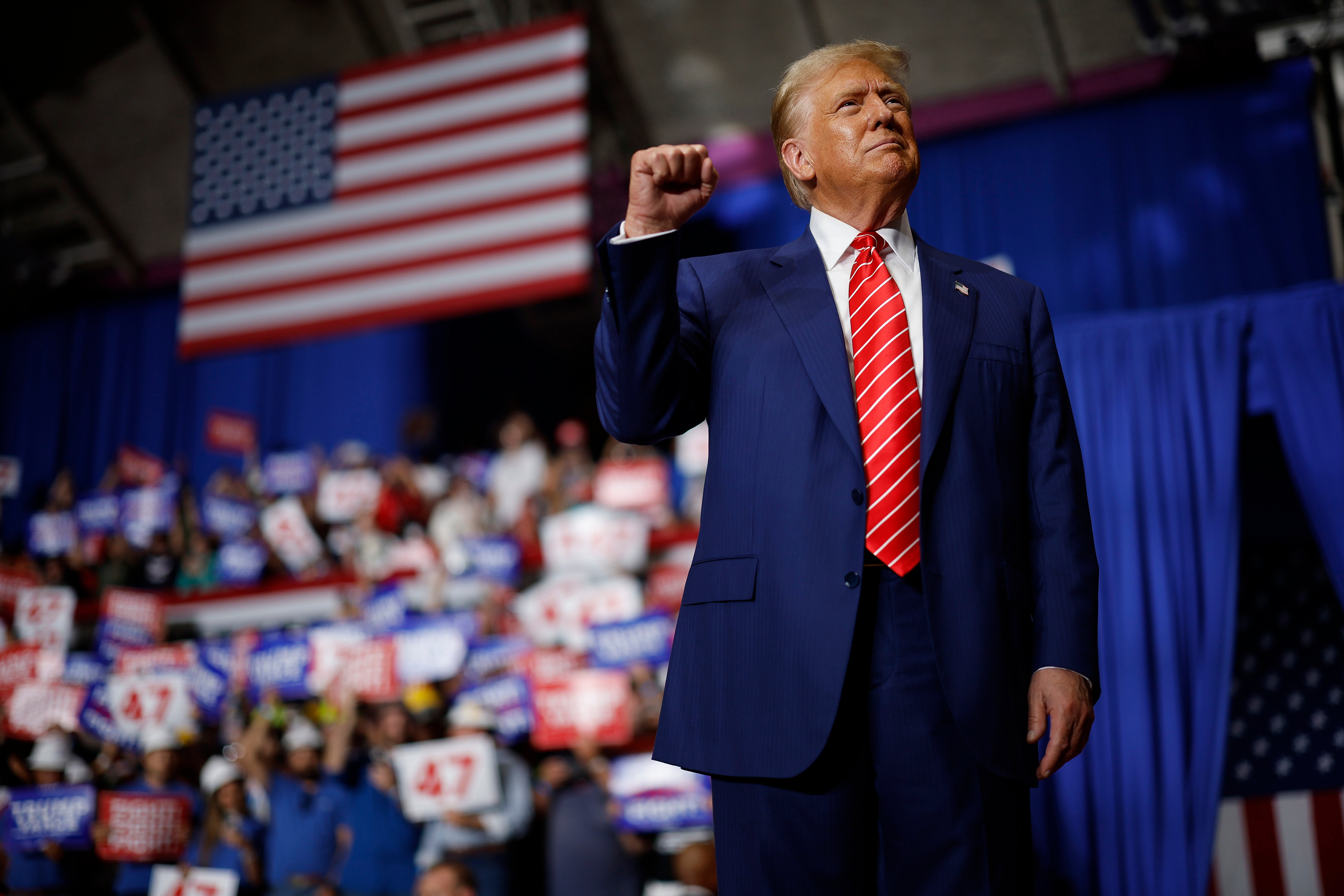Trump accused of deliberately choosing ‘sundown’ towns with racist histories for his rallies

Support truly
independent journalism
Our mission is to deliver unbiased, fact-based reporting that holds power to account and exposes the truth.
Whether $5 or $50, every contribution counts.
Support us to deliver journalism without an agenda.

During a campaign stop at the Livingston County Sheriff’s Office in Howell, Michigan, Donald Trump suggested that deputies there should be deployed to the majority-Black city of Detroit.
“I’d love to have them working there during the election,” he told the group on August 20, standing in front of law enforcement officials and squad cars.
A week later, Trump held a “town hall” in La Crosse, Wisconsin. The next day, he rallied in Johnstown, Pennsylvania. He will speak in the town of Mosinee, Wisconsin, on September 7.
These relatively small cities — spread across midwestern swing states and far from dense metropolitan areas — all have one thing in common: They are former “sundown” towns, where threats of Jim Crow-era violence enforced racial segregation.
After a series of rallies in major cities to kick off his general election campaign, the Republican presidential candidate zeroed in on a handful of cities with familiar pasts.
Viral criticism across social media has argued that Trump’s latest campaign stretch isn’t a coincidence but a “dogwhistle” to racist supporters. Vice President Kamala Harris’s campaign accused the former president of deliberately campaining in the former “KKK capital of Michigan.”
Trump’s campaign has denied the accusations.
Civil rights groups and city leaders have worked over decades to recover their communities from the “sundown” label, so named because of warnings to non-white people to stay off the streets after sunset, with the implicit threat of violence hovering over them.
The former president’s event at the sheriff’s office on August 20 wasn’t just “a dog whistle from Trump,” according to a statement from Harris campaign spokesperson Alyssa Bradley.
“It’s a bullhorn,” she said.
The town of Howell has long been associated with the Ku Klux Klan’s presence in Michigan, thanks to the state’s former “Grand Dragon” Robert Miles, who recruited auto workers into the KKK and staged hate rallies and cross burnings in the majority-white county.
“This is where Donald Trump is choosing to hold his rallies,” said a TikTok user whose video linking the former president’s “troubling pattern” of campaign rally sites to “sundown” histories has been shared widely across social media.
“You got a presidential candidate for the GOP doing a sundown town tour around the country, not looking for political gain,” he added. “He’s f****** rallying the troops.”
Trump’s campaign has argued that Harris and President Joe Biden should be similarly scrutinized.
“Did the media write this same story when Joe Biden visited Howell in 2021, or when Kamala Harris visits cities where racist protests and marches have occurred in the past?” Trump campaign press secretary Karoline Leavitt said in a statement to The Independent.
Biden visited Howell in 2021 to deliver remarks at the Operating Engineers 324 training center. Harris visited La Crosse to discuss abortion rights in April, before she announced her campaign.
“No, of course not, because the mainstream serves as a divisive, anti-Trump, mouthpiece for the Democrat Party,” Leavitt added. “President Trump has delivered a strong message on law and order, making it clear that crime, violence, and hate of any form will have zero place in our country when he is back in the White House.”
Trump campaign communications director Steven Cheung, when asked by The Independent why and how the locations were chosen, and whether the campaign wishes to respond to allegations of racism, offered an all-caps response: “ARE YOU GOING TO ASK KAMALA HARRIS WHY SHE HAS DONE EVENTS IN ALL OF THESE PLACES? “
He then provided a list of Harris campaign stops in larger cities like Atlanta, Detroit, Las Vegas, Philadelphia, and Phoenix, along with links to the Southern Poverty Law Center to “incidents of race based incidents including, racial threats, assaults, incidents of neo-Nazi vandalism, and cases of racial harassment” in those cities.

Today, the town of Howell “is a different place than it was when I was growing up in Michigan,” said Democratic congresswoman Elissa Slotkin, whose district encompasses Livingston County.
“Many local activists, elected leaders, and private citizens have bravely worked to build a more inclusive and welcoming community, even as the old guard with old prejudices still rear their heads,” she wrote on August 20. “I know the people of Livingston County, and I know that change is happening — and that these cowardly people do not reflect the larger community. But Donald Trump didn’t come to Howell today to bring people together, to call out that hateful behavior, or to offer any kind of hopeful vision for the future.”
Trump has repeatedly invited controversy and public debate with his campaign scheduling, leading to allegations of racism and intentional provocation.
In 2020, days after the city was recognizing the anniversary of the 99th anniversary of the Tulsa race massacre, Trump announced plans for a campaign rally on Juneteenth, the annual recognition of the end of slavery in America.
Tulsa’s own Juneteenth celebrations were postponed because of the COVID-19 pandemic. Trump ultimately delayed the event, by one day, to June 20.

Last year, Trump — while at the center of several criminal and civil investigations and alleging his political persecution by federal law enforcement — held his first 2024 campaign rally in Waco, Texas, smack in the middle of the 30th anniversary of the deadly 51-day siege that galvanized the far right and set the stage for the modern militia movement.
In 2021, Trump held a rally in Cullman, Alabama, a town that once advertised “No Blacks and No Indians” and warned “n*****, don’t the let the sun go down on your head” for decades.
“Could it be coincidence that is bringing Trump to these places?” asked former federal prosecutor and University of Alabama law professor Joyce Alene Vance.
“Anything is possible, but Cullman, for instance, is out-of-the-way,” she wrote. “Any number of places in Alabama would’ve been more suitable. Sometimes the dog whistle is actually works, loudly spoken.”




